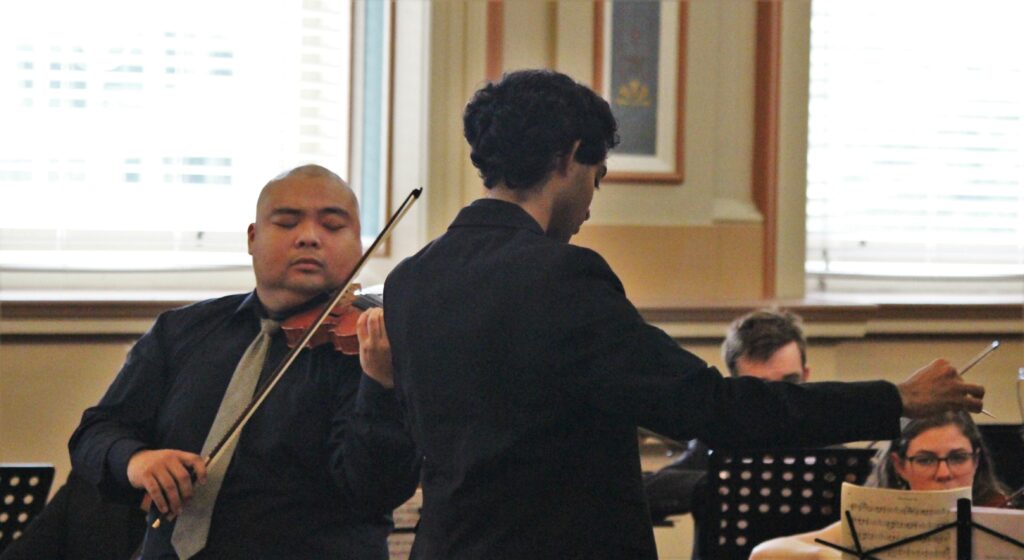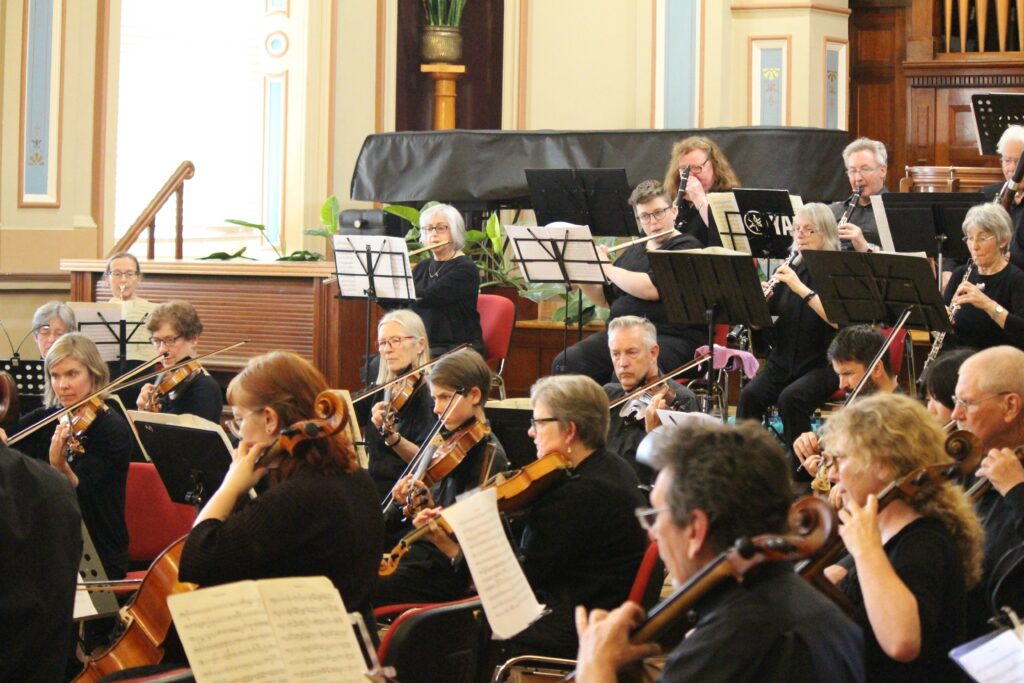Lovers, Heroes and Wanderers
from Peter Donnelly Music Reviews
Derwent Symphony Orchestra
William Newbery, conductor
Caleb Wright, viola
Stanley Burbury Theatre, UTAS
15 June 2025
From the very start of the Johann Strauss II The Gypsy Baron Overture, featuring focused strings and good solos from Kelli Dixon (clarinet) and June Williams (oboe), there was evidence of careful preparation by conductor Will Newbery and the DSO players. The waltz elements here were lilting while brass also provided solid contributions.
It was a felicitous decision to program the Piet Hein Rhapsodie by Dutch composer Peter van Anrooij (1879-1954), a figure little known outside The Netherlands. The 12-minute piece has a swashbuckling romantic style consisting of variations on Dutch folk material and employing rich orchestration. It was given with vibrant attack, clean textures and tidy ensemble work.
However, the real achievement here was in Harold in Italy Op. 16 by Hector Berlioz (1803-1869), inspired by Lord Byron’s epic poem ‘Childe Harold’s Pilgrimage’. A performance of this splendid, yet now infrequently heard, symphony with viola obbligato was made possible by the enthusiasm and calibre of a wonderful soloist – Caleb Wright, Principal Viola with The Tasmanian Symphony Orchestra. His playing was dynamically wide ranging with lovely tone and warm phrasing. There were especially striking moments of shared duets with guest harpist Meriel Owen.
It was startling to again realise that this innovative work with its adventurous harmonies and brilliant flashing orchestration was written as early as 1834! The orchestra rose to the occasion with well-rehearsed work throughout; the inner march and serenade movements were most beautifully done. The ‘Orgy of the Brigands’ finale could have had a touch more fire but the steadier tempo ensured that orchestral discipline was well maintained. Congratulations to all involved on a memorable rendition of a great work!
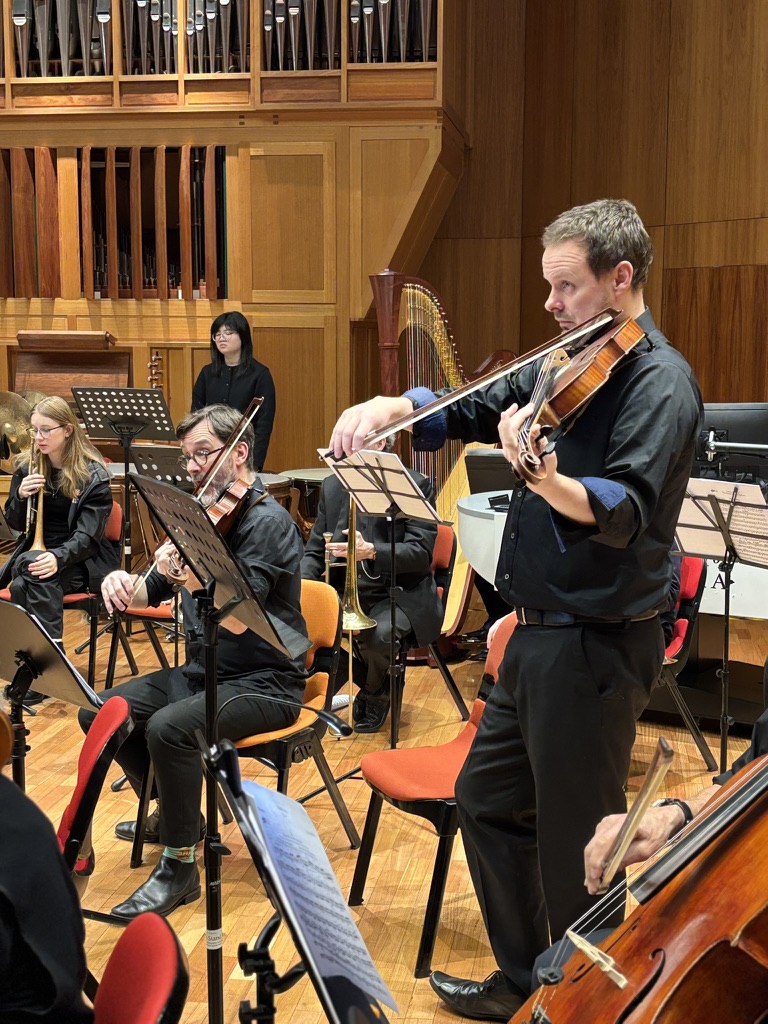
Brahms, Beethoven and a Bass Trombone Review
from Peter Donnelly Music Reviews
Derwent Symphony Orchestra
Alexander Rodrigues, conductor
Simon Ramirez, bass trombone
Stanley Burbury Theatre, UTAS
30 March 2025
It was gratifying to see a good-sized violin section for this enjoyable concert following a period recently when the DSO has struggled to source players. Brahms’s Academic Festival Overture was the first piece – an, at the time, unexpectedly humorous take on student songs composed to celebrate an honorary doctorate awarded to Brahms by the University of Breslau in 1879. Some of the trickier brass passages presented challenges but there was good work from the strings and the jolly mood was well conveyed, though cymbals were omitted; the composer’s only use of the instruments in his orchestral output.
Conductor Alexander Rodrigues recalled the DSO playing through all 9 of the Beethoven symphonies with him in rehearsal over the weeks from June 2020 when isolation rules due to Covid-19 made public performance impossible. Here they finally got to publicly undertake the Symphony No. 1 in C major, Op. 21. There was some commendable string and wind ensemble playing; tympanist Benjamin Raymond’s contribution was notably enthusiastic and precise. The conductor’s feeling for rhythmic pulse and shaping of the work was evident; the third movement especially was nicely buoyant in tempo.
Finally, New Zealand born, U.K. based composer Paul Sarcich’s Concerto for Bass Trombone (1984-5) was given by Simon Ramirez. This vibrant and colourful piece incorporates syncopated rhythms and is colourfully scored with frequent jazz and blues influences. It was an immediately appealing and frequently exciting work exploiting the full range of the bass trombone. The soloist gave a spectacular display of technical command while the orchestra managed the complex accompaniment with skill.
Peter Donnelly
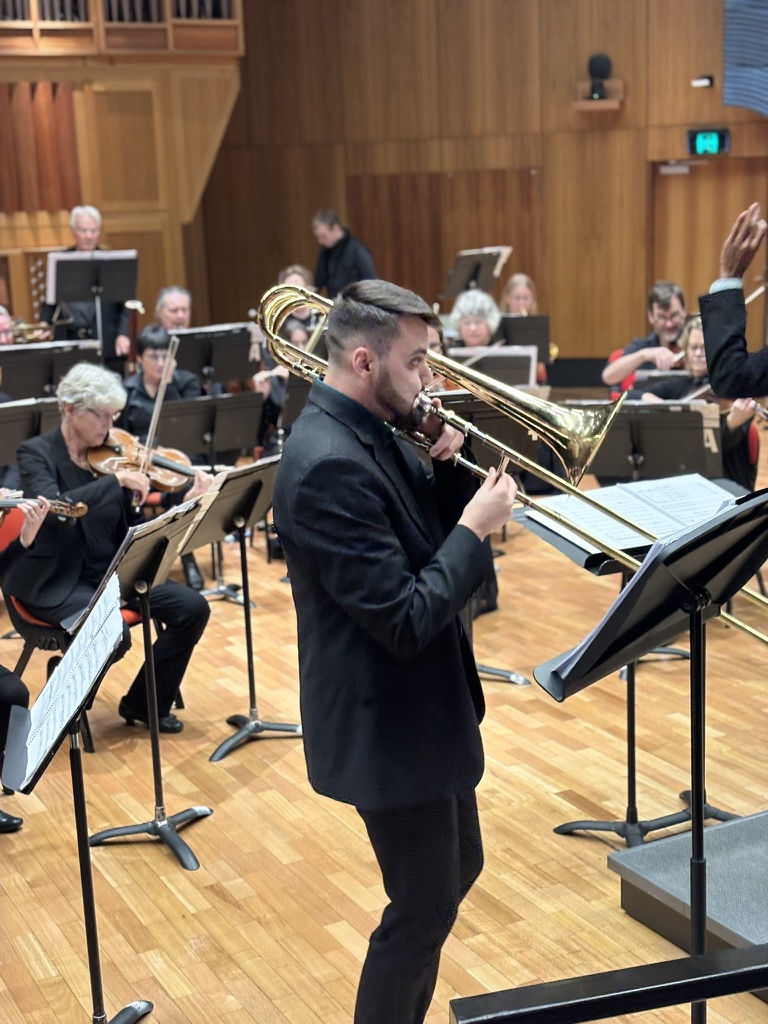
Song and Dance Review
from Peter Donnelly Music Reviews
Derwent Symphony Orchestra
Jack Machin, conductor
Cradle Coast Orchestra
Robb Dennis, conductor
Combined Orchestras
Jacqueline Ward, soprano
Hobart City Hall
03 November 2024
For their final concert for 2024 the DSO were joined by the Cradle Coast Orchestra from Burnie for a delightful program of light Classical and Show music.
The Overture to Orpheus and the Underworld by Offenbach was the rousing opener, with the DSO conducted by the irrepressible Jack Machin and fine solo turns from Kelli Dixon (clarinet), Sara Mason (oboe), Anne John (cello), and Christina Sigrist (violin). While the venue, a last-minute change from UTAS Stanley Burbury Theatre, gave a warm enveloping sheen to the quieter music, the sound became boomy at louder volume levels. The remainder of the DSO’s initial bracket comprised well-chosen selections by Bizet, Tchaikovsky, and Brahms. Harpist Juliann Green’s and flautist Rosemary Holloway’s duet from Bizet’s Carmen suite was a highlight.
A selection from the Cradle Coast Orchestra conducted by Robb Dennis started with the splendid sound of Ian Cooper’s trumpet in the jazzy/bluesy score for Kander’s Chicago. Handel’s Water Music and the lively rhythms of Hardiman’s Lord of the Dance followed.
The combined orchestras played Lerner/Loewe My Fair Lady selections and soprano Jacqueline Ward performed a lovely vocal version of the famous Largo movement – Going Home – from Dvorak’s New World Symphony. To conclude, Robb Dennis directed an exciting and tightly controlled Verdi Nabucco Overture where the brass and percussion produced impressive results.
All the performances were carefully prepared and there was a happy mood all round at this entertaining event.
Peter Donnelly
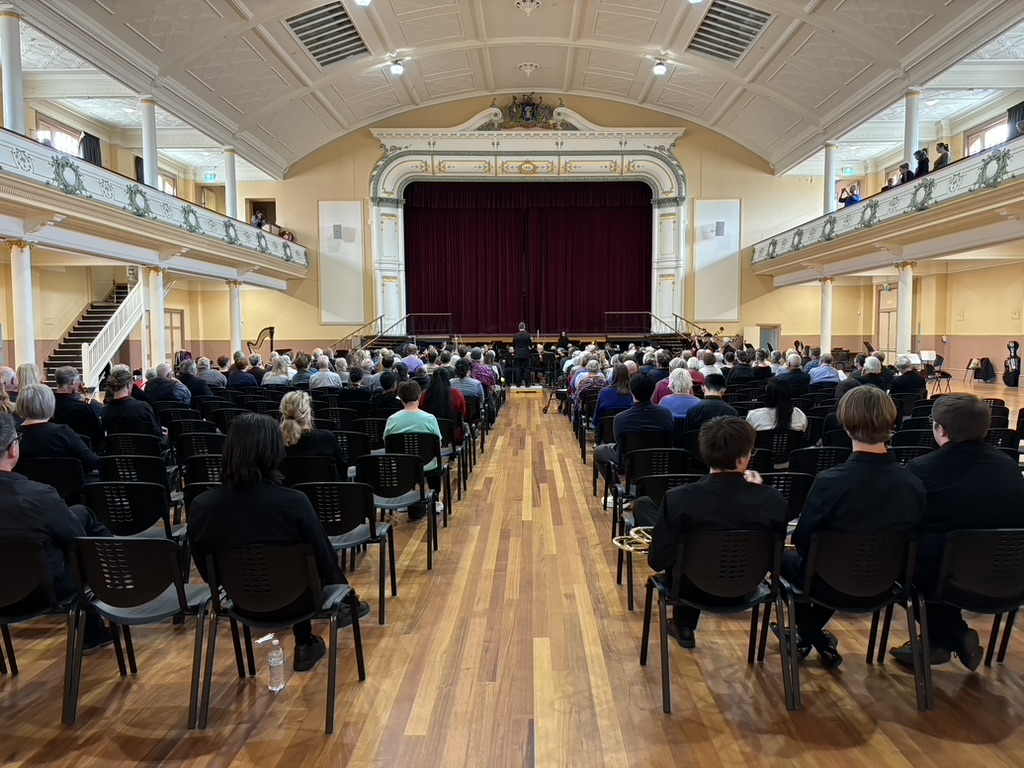
A Winter Concert Review
from Peter Donnelly Music Reviews
Derwent Symphony Orchestra
William Newbery, conductor
Angus Deeth, clarinet
Stanley Burbury Theatre, UTAS
18 August 2024
Beethoven’s ‘The Consecration of the House (Overture), Op. 124’ is a first-rate piece, clearly influenced by Handel and full of wit and high spirits. I fear that it suffered from lack of sufficient rehearsal time on this occasion, the DSO struggling with intonation and ensemble issues. Even so, the vitality of the work came through and timpanist Benjamin Raymond had a fine workout.
It could have been a different ensemble accompanying Angus Deeth’s splendid performance of Weber’s ‘Clarinet Concerto No. 2 in E flat, Op. 74’. He brought great verve and sparkle to this engaging concerto as well as plenty of warmth and expressiveness in the slow movement. An early Romantic work like this really sprang to life with such committed playing; Newbery and the orchestra provided neat and accurate support to the soloist throughout.
César Franck’s ‘Symphony in D minor’, a three-movement Romantic symphony in cyclic form much influenced by Wagner’s sound world, does not seem to receive the regularity of performances it once enjoyed. It was a welcome choice and the personal selection for this program by conductor Newbery. The DSO gave of their best here with some nicely balanced textures in spite of a shortage of violins and some full-on brass passages. The conductor also paid commendable attention to dynamics, especially in the central Allegretto with its fine cor anglais solo from Emma Peacey. All in all, this was a most enjoyable afternoon of musicmaking.
Peter Donnelly
From the New World Review
from Peter Donnelly Music Reviews
Derwent Symphony Orchestra
Damien Holloway, conductor
James Anderson, cello
Stanley Burbury Theatre, UTAS
02 April 2023
It was good to have this longstanding community orchestra back and tackling such big masterworks as these after a relatively quiet 2022 season. Indeed, the task of bringing technically challenging pieces such as these to performance standard only really faltered in the opening Barber Adagio for Strings (1938) where the difficult central section was let down by intonation and ensemble issues.
However, Dvorak’s Concerto for Violoncello and Orchestra in B minor, Op. 104 (1896) came up wonderfully well. Soloist James Anderson played with fine control and variety of expression. He was particularly sensitive in the second movement Adagio ma non troppo with notable support from the wind players – flautist Gianni Posadas-Sen deserving special mention. The brass tuttis in the outer sections brought some splendid moments and the first movement horn solo was well taken by Aidan Connors. James’s cello sounded especially poignant in that elegiac coda towards the end of the final movement.
Conductor Damien Holloway gave an introductory talk concerning Amy Beach’s Symphony in E minor (Gaelic), Op. 32 (1895). This first symphony by an American woman (1867-1944) to be published and performed by a major orchestra was composed at the same time that Dvorak wrote his famous concerto. The programming of this little known work was a brave decision and rumour has it that the rehearsals were difficult with key brass players available only at the last minute. The conductor’s clear enthusiasm for the 4-movement piece was certainly warranted and the orchestra gave of their best for him. This symphony, with its frequently turbulent mood and abundance of Irish tunes, has a powerful sweep and forward momentum that is infectious. Although the performance standard inevitably had some rough edges, overall this was hugely enjoyable with excellent brass and first-rate solo work from concertmaster Kevin Kang. The woodwinds gave their best playing of the day in the second movement Alla Siliciana – Allegro vivace. This was a considerable achievement for both the DSO and conductor Damien Holloway.
Peter Donnelly
Music of Film Review
from Peter Donnelly Music Reviews
Derwent Symphony Orchestra
The Cradle Coast Orchestra
David Bird and Robert Bentley, conductors
Stanley Burbury Theatre, UTAS
13 June 2021
This concert brought together some 80 performers consisting of the DSO and visiting Cradle Coast Orchestra from the NW Coast along with augmenting players. The resulting ensemble was easily the largest orchestra heard in Tasmania since pre pandemic. While the title ‘Music of Film’ was a bit misleading with the program only including one actual film score, there was a well-chosen selection of fun pieces.
Things got off to a shaky start with some clearly under rehearsed results in the Bizet L’Arlesienne Suite No 2 where good wind playing was a redeeming feature. However from the arresting opening snare drum of Rossini’s ‘The Thieving Magpie’ Overture under David Bird’s taut direction, standards were high with crisp, alert articulation and good coordination if at a rather stately tempo. The famous Rossini crescendo was well handled as the piece proceeded to its climax.
The Richard Rodgers/Robert Russell Bennett collaboration for the 1952 television series ‘Victory at Sea’ was sumptuously orchestrated, rousing, tuneful stuff with the American flag flying triumphantly in a very aspirational 1950s way. I’ve always loved this music and a suite from the full score was robustly performed here under the direction of Robert Bentley with all the verve, colour (and volume!) one could want.
David Bird again led the large ensemble with authority and control in excerpts from John Williams’s wonderfully memorable music for the original Jurassic Park movie. DSO concertmaster Joseph Phillips contributed extensive, informative and entertaining program notes to complement a most enjoyable afternoon’s entertainment.
Peter Donnelly
Schubert & Tchaikovsky Review
from Peter Donnelly Music Reviews
Derwent Symphony Orchestra
Alexander Rodrigues, conductor
Kevin Kang, violin
Hobart Town Hall
18 April 2021
The Derwent Symphony Orchestra’s last concert took place in November 2019. In June 2020 following the Covid lockdown they recommenced regular rehearsals with conductor Alexander Rodrigues every Monday night, working their way through orchestral repertoire staples including all nine Beethoven symphonies and featuring a number of soloists from their ranks. This program was the DSO’s first public performance in 17 months.
It should be noted upfront that the standard and consistency of playing and ensemble here was the best that I can recall from this source based on many years of attending their concerts. Clearly the period of long preparation and work with the one conductor has enabled the attainment of standards only rarely approached in the past.
With the orchestra of 44 occupying floor space in front of the stage of the Town Hall and a capacity audience, the sound quality was loud and immediate. Schubert’s Symphony No 4 in C ‘Tragic’ certainly sounded bigger and grander than usual. The tempi were broad but also trenchant and convincing with plenty of intensity where needed as well as real warmth in the Andante slow movement.
Kevin Kang brought remarkable assurance and virtuosity to the solo part in Tchaikovsky’s Violin Concerto in D. Careful preparation was everywhere in evidence from the soloist, and orchestra which was obviously stretched to its limits but nonetheless nearly always managed to surmount the constant technical challenges under the guidance of conductor Rodrigues. The woodwind playing in particular was consistently fine. Thrilling stuff indeed! To top it all, Kevin Kang offered the hair-raisingly difficult violin solo in Heinrich Wilhelm Ernst’s Variations on ‘The Last Rose of Summer’ as an encore.
The excellent program notes by concertmaster Joseph Phillips also deserve commendation. This was a special occasion and full marks go to conductor, soloist, and orchestra for their considerable achievement.
Peter Donnelly
